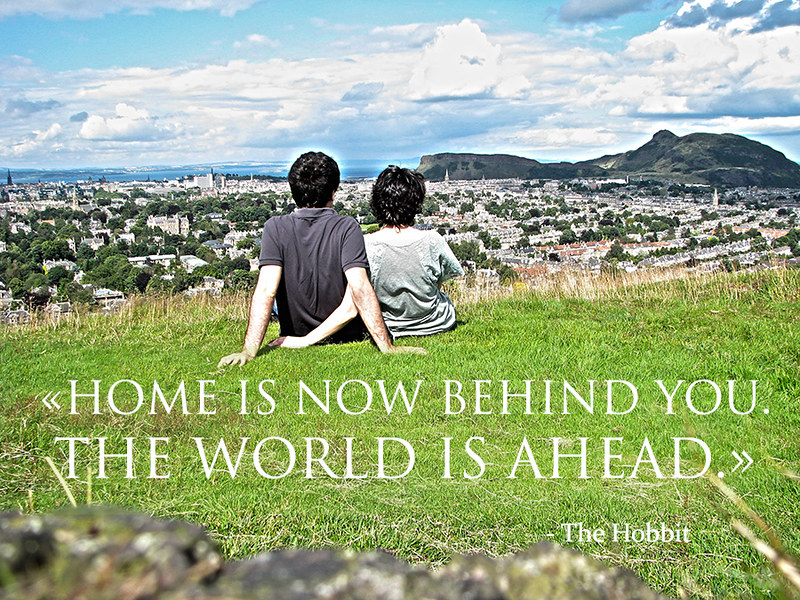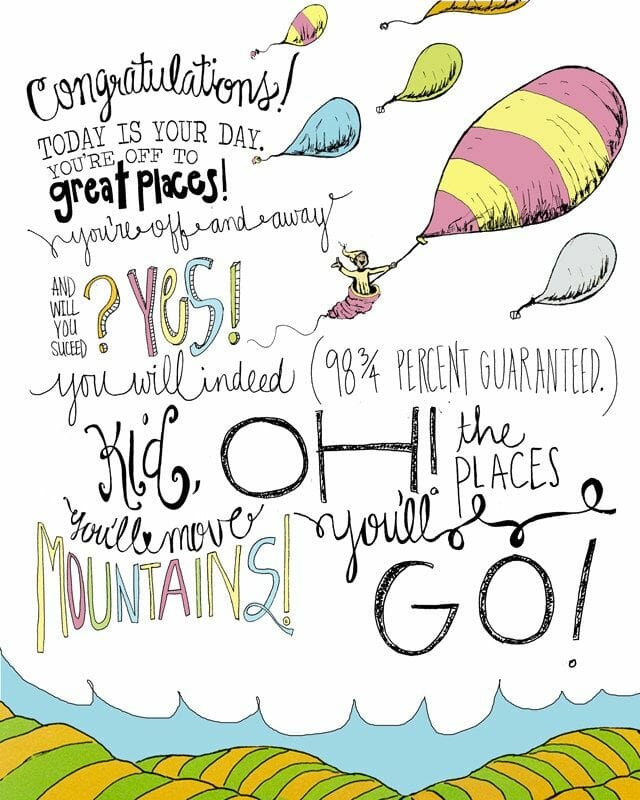I originally wrote and published this article in Spanish.
As we brace ourselves to move abroad for the third time in a few years, I look back and I know that squeezing our lives into a suitcase and leaving our native Barcelona was the best decision that we could have possibly made. Because when you move away, when you turn your life into a journey filled with uncertainty, you grow up in unexpected ways.

You face new challenges, you get to know parts of you you didn’t know existed, you’re amazed at yourself and at the world. You learn, you broaden your horizons. You unlearn, and after coming down and embracing a few lessons, you start growing in humility. You evolve. You feel homesick… and you shape memories that will stay with you forever. If you’ve ever lived away from home or embarked on a long journey, I’m sure you too have felt these 17 things that change forever when you live abroad.
1. Adrenalin becomes part of your life.
From the moment you decide to move abroad, your life turns into a powerful mix of emotions – learning, improvising, dealing with the unexpected… All your senses sharpen up, and for a while the word “routine” is dismissed from your vocabulary to make space for an ever rising adrenalin thrill ride. New places, new habits, new challenges, new people. Starting anew should terrify you, but it’s unusually addictive.
2. But when you go back… everything looks the same.
That’s why, when you get a few days off and fly back home, it strikes you how little everything has changed. Your life’s been changing at a non-stop pace, and you’re on holidays and ready to share all those anecdotes you’ve been piling up. But, at home, life’s the same as ever. Everyone keeps struggling with their daily chores, and it suddenly strikes you: life won’t stop for you.
3. You lack the (and yet you have too many) words.
When someone asks you about your new life, you lack the right words to convey all you’re experiencing. Yet later, in the middle of a random conversation, something reminds you about ‘that time when’…, and you have to hold your tongue because you don’t want to overwhelm everyone with stories from your ‘other country’ and come across as pretentious.

4. You come to understand that courage is overrated.
Lots of people will tell you how brave you are – they too would move abroad if they weren’t so scared. And you, even though you’ve been scared, too, know that courage makes up about 10% of life-changing decisions. The other 90% is purely about wanting it with all your heart. Do you want to do it, do you really feel like doing it? Then do it. From the moment we decide to jump, we’re no longer cowards nor courageous – whatever comes our way, we deal with it.
«It’s a dangerous business, Frodo, going out your door. You step onto the road, and if you don’t keep your feet, there’s no knowing where you might be swept off to.»
5. And, suddenly, you’re free.
You’ve always been free, but freedom feels different now. Now that you’ve given up every comfort and made it work thousands of miles away from home… you feel like you’re capable of anything!

6. You no longer speak one particular language.
Sometimes you unintentionally let a word from another language slip. Other times you can only think of a way of saying something… with that perfect word which, by the way, is in the wrong language. When you interact with a foreign language on a daily basis, you learn and unlearn at the same time. All the while you’re soaking up cultural references and swear words in your second language, you find yourself reading in your mother tongue so it won’t get rusty. Like that time when Homer took a home winemaking course and forgot how to drive.
7. You learn to say goodbye… and to enjoy yourself.
You soon realize that now, most things and people in your life are just passing through, and you instinctively play down the importance of most situations. You perfect the right balance between bonding and letting go – a perpetual battle between nostalgia and pragmatism.
8. You have two of everything.
Two SIM cards (one of them packed with phone numbers from all over the world), two library cards, two bank accounts… And two types of coins, which always end up mysteriously mixing when you’re about to pay for something.
9. Normal? What’s normal?
Living abroad, like traveling, makes you realise that ‘normal’ only means socially or culturally accepted. When you plunge into a different culture and a different society, your notion of normality soon falls apart. You learn there are other ways of doing things, and after a while, you too take to that habit you never thought you’d embrace. You also get to know yourself a little better, because you discover that some things you really believe in, while others are just a cultural heritage of the society you grew up in.
10. You become a tourist in your own city.
That tourist trap you may not have visited in your country only adds up to the never-ending list of things to do in your new home, and you soon become quite the expert on your new city. But when someone comes over for a few days and asks for some suggestions, you find it really hard to recommend but a few things – if it were up to you, you’d recommend visiting everything!

11. You learn how to be patient… and how to ask for help.
When you live abroad, the simplest task can become a huge challenge. Processing paperwork, finding the right word, knowing which bus to take. There’s always moments of distress, but you’re soon filled with more patience than you ever knew you had in you, and accept that asking for help is not only inevitable, but also a very healthy habit.
12. Time is measured in tiny little moments.
It’s as if you were looking through the car window – everything moves really slowly at the back, in the distance, while in front of you life passes by at full speed. On the one hand, you receive news from home – birthdays you missed, people who left without you getting the chance to say goodbye one last time, celebrations you won’t be able to attend. On the other hand, in your new home life goes by at top speed. Time is so distorted now, that you learn how to measure it in tiny little moments, either a Skype call with your family and old friends or a pint with the new ones.
13. Nostalgia strikes when you least expect it.
A food, a song, a smell. The smallest trifle can overwhelm you with homesickness. You miss those little things you never thought you’d miss, and you’d give anything to go back to that place, even if it were just for an instant. Or to share that feeling with someone who’d understand you…
14. But you know it’s not where, but when and how.
Although deep down, you know you don’t miss a place, but a strange and magical conjunction of the right place, the right moment and the right people. That year when you traveled, when you shared your life with special ones, when you were so happy. There’s a tiny bit of who you were scattered among all the places you’ve lived in, but sometimes going back to that place is not enough to stop missing it.

15. You change.
I’m sure you’ve heard about life-changing trips. Well, they’re not a commonplace – living abroad is a trip that will profoundly change your life and who you are. It will shake up your roots, your certainties and your fears. Living in Edinburgh changed us forever in many ways, and if it weren’t for that experience, we probably wouldn’t be about to embark on our next life adventure right now. Maybe you won’t realise it, or even believe it, before you do it. But after some time, one day you’ll see it crystal clear. You’ve evolved, you’ve got scars, you’ve lived. You’ve changed.
16. You fit your home into a suitcase.
From the moment you squeeze your life into a suitcase (or, if you’re lucky with your airline, two), whatever you thought ‘home’ was doesn’t exist anymore. Almost anything you can touch can be replaced – wherever you travel, you’ll end up stockpiling new clothes, new books, new mugs. But there will come a day when you’ll suddenly feel at home in your new city. Home is the person traveling with you, the people you leave behind, the streets where your life takes place. Home is also the random stuff in your new flat, those things you’ll get rid of in the blink of an eye when the time to leave comes. Home is all those memories, all those long-distance calls with your family and friends, a bunch of pictures. Home is where the heart is.

17. And… there’s no turning back.
Now you know what it means to give up comfort, what starting from scratch and marveling at the world every day feels like. And it being such a huge, endless world… How could you choose not to keep traveling and discovering it?
Have you ever lived abroad? Is there anything you would add to this list? Drop us a comment and tell us about your experience!
I originally published this article in Spanish a few weeks ago. Lots of people asked for an English version, but please bear in mind English is not my native language and this is only a humble attempt at a translation. I apologise in advance for any mistakes – if there’s anything you’d like to point out, please drop me a comment below. Thank you! Angie
ORGANIZA TU VIAJE
ATRACCIONES
Ahorra en Edimburgo con el billete Royal Edinburgh
AEROPUERTO
Reserva el bus del aeropuerto al centro de Edimburgo
TOURS EN ESPAÑOL
- Disfruta de la visita guiada al Castillo de Edimburgo
- Reserva el Tour gratis por Edimburgo
- Reserva el Tour gratis de Harry Potter y Edimburgo
EXCURSIONES POR ESCOCIA
Reserva las más populares:
SEGURO DE VIAJE
Imprescindible. Nosotros siempre usamos el de Heymondo con un 5 % de descuento para viajar en cualquier fecha (15 % para familias).
Paga en £
Nuestra tarjeta favorita para viajar y ahorrar comisiones es Revolut, que ofrece 10 € de bienvenida aquí.
INTERNET UK
Compra una tarjeta con datos ilimitados y conéctate desde el primer minuto con un 5 % de descuento.
HOTELES
Consigue las mejores ofertas reservando hotel en Edimburgo con antelación.










yes, most of what’s written here is true but I am left with the feeling the writer makes much a bigger deal of it than it really is. Yes, we live in a foreign country, yes we sometimes feel homesick but even abroad you get caught in the routine, new places become familiar places, new faces become your best friends, in a word you adjust and that’s the end of it. Too much poetry and make believe and not enough reality here, imho.
Also, things DO change back home, the fact is that WE live in the past when we get back – that’s why sometimes we come across as pretentious to our old friends: people who have stayed have the same amount of stories to tell than we do, it’s just that we don’t relate to them anymore and deep down we don’t care to hear them. Be careful with this “I live abroad therefore I live a more interesting life than you” attitude because that’s what will, in the end, destroy your long time friendships. Also, it’s not true.
I can only agree with everyone before me. I’ve changed countries 3 times as well (from Germany to US 2x, and now to Switzerland, and even though not far distance-wise it’s still a different culture) and I have experienced every single one of them and also the “seeing familiar faces” all over the place.
Thanks for that wonderful article and brining back a few special moments!
Loved this article! You describe exactly how it feels. To leave everything behind for the unknown, and come back one day and realize you have changed so much that nothing will ever feel the same.
Wow! First your English is amazing, this article was so moving for me. I have lived here in Barcelona for 3 years and will be heading home to the US for 1 year before we head back to Glasgow. I couldn’t have said it better myself. Donde puedo encontrar la version en castellano?
Hi, Jade, thank you so much! 😀 You can read the original Spanish article here: https://masedimburgo.com/2014/05/10/cosas-que-cambian-para-siempre-cuando-vives-en-otro-pais/ ¡Un saludo!
Thank you so much for putting this into words – by the way, your English is perfect!
I moved to England one year ago, I’ll move to Spain in a few months and I’m gonna learn my third language (hey, I’ll be able to read this article in Spanish then!). It’s exciting and scary at the same time, and pretty hard to do now that I got used to my city and love it so much.
But I’ll keep your words in mind and deal with it at my best 🙂 thank you!
Beautiful article! You perfectly explained many of my emotions of my expatriate life. I have lived in 5 countries in 12 years. I have gained much, missed many and learned more about myself than I had ever dreamed possible !
Everything the above article claims is true. The only thing I can think of adding is getting excited when listening to random people talking in your native language. The problem is, it keeps happening AFTER your return because sometimes you momentarily think you still are abroad. Only four months as an Erasmus student were enough for me to keep thinking “Hell, they speak greek!!!” at random moments when walking in the street and listening to strangers talking to each other, for a whole year after my return in Greece.
Returning home after a decade of living in many different countries–none of which shared my language, history, cultural norms or conventions–I find that the changes to my perception and understanding have also changed me to the point where my home culture is no longer my culture. In fact, I have no particular culture–just an amalgam of all the cultures in which I have lived. The effects are bittersweet– I have much less in common with those with whom I grew up, but have a much broader understanding of difference and possibilities. I cannot put it any more eloquently than the following quote someone sent me:
An old vagabond in his 60s told me about it over a beer in Central America, goes something like this: The more places you see, the more things you see that appeal to you, but no one place has them all. In fact, each place has a smaller and smaller percentage of the things you love, the more things you see. It drives you, even subconsciously, to keep looking, for a place not that’s perfect (we all know there’s no Shangri-La), but just for a place that’s “just right for you.” But the curse is that the odds of finding “just right” get smaller, not larger, the more you experience. So you keep looking even more, but it always gets worse the more you see. This is Part A of the Curse.
Part B is relationships. The more you travel, the more numerous and profoundly varied the relationships you will have. But the more people you meet, the more diffused your time is with any of them. Since all these people can’t travel with you, it becomes more and more difficult to cultivate long term relationships the more you travel. Yet you keep traveling, and keep meeting amazing people, so it feels fulfilling, but eventually, you miss them all, and many have all but forgotten who you are. And then you make up for it by staying put somewhere long enough to develop roots and cultivate stronger relationships, but these people will never know what you know or see what you’ve seen, and you will always feel a tinge of loneliness, and you will want to tell your stories just a little bit more than they will want to hear them. The reason this is part of the Curse is that it gets worse the more you travel, yet travel seems to be a cure for a while.
None of this is to suggest that one should ever reduce travel. It’s just a warning to young Travelers, to expect, as part of the price, a rich life tinged with a bit of sadness and loneliness, and angst that’s like the same nostalgia everyone feels for special parts of their past, except multiplied by a thousand.
Quite a good piece. Moving from Nigeria to Europe evokes the feeling of thrownness in the sea of the unknown, but finding home across the divide proves the sameness of all humanity.
As someone who moved from Bulgaria to Denmark to study in university – this article hit the spot! I can also agree on what several people before me mentioned – constantly thinking you see people you know from one place in another 🙂